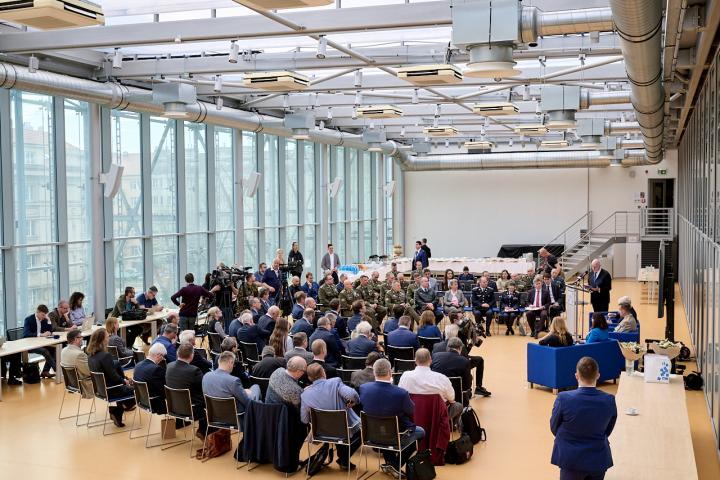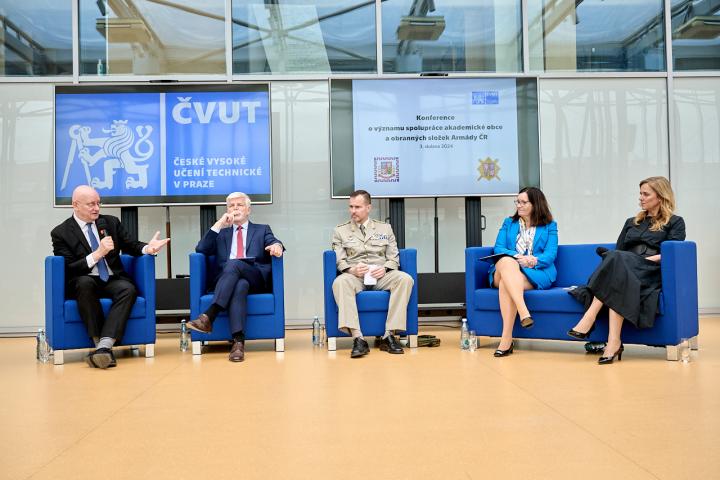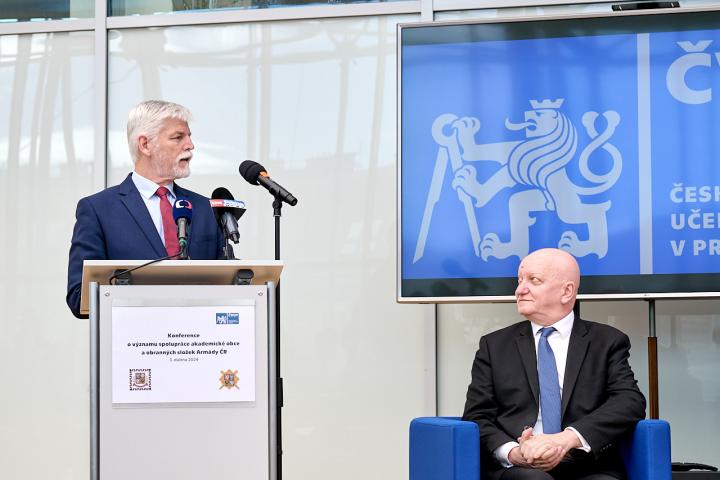
In his opening speech, President Petr Pavel said there are real threats and that some "like to ignore them and label others as those who want war". However, even with the war in Ukraine clearly not coming to an end, we must not wait for anything to happen. "If we do not want to marely wait, we must work on our defence. And there is room for cooperation between the Czech Army and the Czech Technical University, but also with other universities and industry. Capitalizing on university research, the use of synergies by the army and the results of cooperation between academia and the military will ultimately bring results not only for us, but also for our allies. We will increase the defence capability, prestige and credibility of our country," said Pavel. "I am pleased that this conference is being held, and I am ready to help, for example, to point out administrative, financial and other problems," the president stressed.
"The conflict in Ukraine clearly shows that national defence must have a nation-wide dimension. In cooperation with the CTU, we therefore want to push for defence research to be perceived in this way. The Defence Ministry currently spends almost CZK 450 million annually on research and development," said General Karel Řehka, Chief of the General Staff of the Czech Armed Forces. According to him, the army is very aware of the dynamic development of technologies that have a major impact on the way of warfare. "That is why we place innovation and technology among the six strategic objectives of building the Army's capabilities for the next ten years. The requirement for technological development resonates also in the new Defence Strategy of the Czech Republic and in the alliance documents," Řehka added.
According to the President and the Chief of General Staff, strengthening Czech defence is of European importance. Ambassador Edita Hrdá also spoke in this spirit, mentioning the Czech involvement in the European Union: "Whether it is the Czech leadership of the EDA or involvement in the development of strategic documents of the European Union that address underfunding and fragmentation of efforts. The world wants to see the EU as a great power and it is time for it to start behaving like one - thanks also to the Czech Republic."
Vojtěch Petráček, Rector of the Czech Technical University, is convinced that the readiness of our society to defend and deter those who want to achieve their goals through violence and war is becoming more and more important. "Here I see a very important task and goal for our university and academia in general. It's about working with our defence forces to build what I would call an intelligent deterrent force that can deter our potential adversaries. After all, it is part of our role and mission as universities to support the society in which universities exist!" Petráček said. He recalled that a total of 13 universities are now represented in the discussion on this crucial topic.
All speakers agreed on the need to strengthen investment in research, to increase competitiveness, to reduce fragmentation of efforts and to link individual segments, to introduce innovative solutions also in defence companies. Finding financial resources and working to simplify acquisition processes are important. "When researching and putting innovation to work, you can't have the Army's acquisition processes set up for years," said President Petr Pavel. "We also need to change the mind-set in looking at research funding, not being afraid to take risks if we want to break out of mediocrity," he added.
As it was mentioned at the conference, there are currently 47 topics of cooperation between academia and the military, at various stages. In terms of breakthrough technologies that have major transformational potential, these include artificial intelligence, big data, robotics, new materials, energy sources, biotechnology, space and quantum technologies.
The cooperation between CTU and the Czech Army has its own tradition and history. However, since April last year, with the signing of the Memorandum of Cooperation between the two institutions, it has been much more intense. In December last year, the first professional conference was held, where the Army of the Czech Republic defined its areas of interest for cooperation with the academic community. By May this year, expert dialogues and the preparation of joint projects will be ongoing. Currently, out of 47 defined topics, 16 expert discussions have already taken place and more are in the pipeline. Topics of discussion include automated analysis of the information environment, the characteristics of 3D printing, alternative fuels and the use of artificial intelligence in education.
In the discussions, academics and soldiers define the scope of cooperation, address challenges with respect to the capabilities of academia, the planned involvement of CTU in personnel training, and innovations in the Czech Armed Forces within the WG Innovation Hub. They also discuss the possibility of testing drones at the Czech Army exercises, as well as the modification of the Cyber Security specialization of the Open Computer Science study programme. The aim is to prepare experts for the protection of critical infrastructure. CTU is currently involved in R&DaI projects. And, as rector Vojtěch Petráček reminded, CTU also became the first institution in the Czech Republic to join the IBM quantum computer network.

